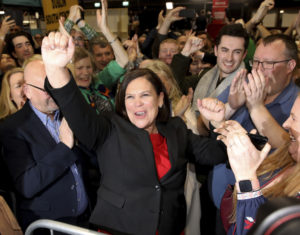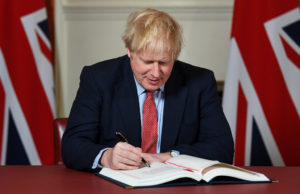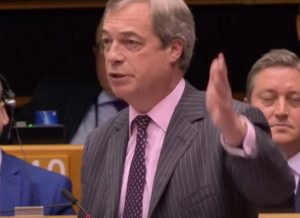Why Jeremy Corbyn Ultimately Backed a New Brexit Vote
The Labour leader has long resisted calls within his party for a second referendum. An expert explains his decision to reverse course. British Labour Party leader Jeremy Corbyn. (Francisco Seco / AP)
British Labour Party leader Jeremy Corbyn. (Francisco Seco / AP)
What follows is a conversation between Professor Leo Panitch and Sharmini Peries of the Real News Network. Read a transcript of their conversation below or watch the video at the bottom of the post.
SHARMINI PERIES: It’s The Real News Network. I’m Sharmini Peries, coming to you from Baltimore.
Last week, Britain’s Labour Party made a rather surprising turnaround on Brexit by opening the door to the possibility of another referendum on Brexit.
JEREMY CORBYN: The Prime Minister’s botched deal provides no certainty or guarantees for the future, and was comprehensively rejected by this House. We cannot risk our country’s industry and people’s livelihoods. And so if it somehow does pass in some form at a later stage, we believe there must be a confirmatory public vote to see if people feel that’s what they voted for.
SHARMINI PERIES: Until now, the Labour Party leader Jeremy Corbyn took the position that the 2016 Brexit referendum, according to which the UK would leave the European Union, was going to be the position of the Labour Party. However, the recent departure of seven Labour Party members over how the party was handling Brexit, and also recent allegations of antisemitism against the party, all led to the unexpected announcement by the Labour Party leader about favoring a second Brexit referendum.
Is this a concession to the Labour Party dissidents and the Blairites in the Labour Party? That’s a question we’re going to take up with our next guest, Leo Panitch. Leo is a senior scholar and professor emeritus of political science at York University, and he is the author of the book The End of Parliamentary Socialism: From New Left to New Labour. Thanks for joining us, Leo.
LEO PANITCH: Hi, Sharmini.
SHARMINI PERIES: All right, Leo, let’s start off with why did Jeremy Corbyn take this step to agree to a second referendum?
LEO PANITCH: They’ve been trying to balance those portions of the Labor Party which have been anti-EU, anti-joining Europe, going all the way back to the first referendum in 1975 when the party was split over this. So was the Tory party. Those splits in both parties have continued to this day, and in the context of the great crisis of the last 10 years, different elements have used it as a way of reviving the anti-European mood. Some of it in reactionary ways; some of it in ways that tie Europe, quite rightly, to the politics of neoliberal globalization that led to the crisis.
There’s always been these divisions in both parties, and certainly in the Labour Party. The manifesto that Jeremy Corbyn did so well on, “For the many, not the few,” in the last election said that Labour would accept the outcome of the referendum. It did not say, however, that it would accept an outcome which would make Britain even more neoliberal. And since then they’ve had to walk a tightrope. Corbyn has always made it clear that he doesn’t want to leave on a racist, anti-immigration basis. He’s always made it clear that Labour’s position was in favour of a customs [union]. There was no walking away without understanding that there would have to be a deal with the European Union of a kind that would be more or less progressive.
So they’ve been consistent, in that respect. And he, for a while, has been quite successful in avoiding taking a choice. The right wing of the Labour Party, the Blairites, joined by others who have starry eyes about Europe who aren’t necessarily Blairites, are strongly Remain, and so are a lot of the Labour Party members, especially in the South. Especially among younger people. And he was able to, by saying we want a certain type of linkage with the European Union, one that has a customs union, as close to a single market as possible, the acceptance of the best rules as possible, and human rights, and labour rights, et cetera, he was able to make a bit of an appeal to those who actually want to remain. At the same time, by saying we accept the outcome of the previous referendum, he was making an appeal to those who wanted to leave, many of whom represent constituencies who voted to leave, and who are in danger of falling to a right-wing UKIP anti-immigrant appeal, which could be revived in a second referendum. Increasingly–he did well with that because, you know, if you were going to vote one way or the other, you might as well vote for this Corbyn line, which was closer to Europe than the Tories, and yet was closer to leaving on good principles.
Now, it came to the point where the momentum, small M momentum, behind those who wanted a second referendum, which had been led by the old Blairite element of the party, has been such, so great, that the pressure became greater and greater, and it looked like Corbyn was being irrelevant to the debate. Voting against May’s deal as a bad deal, insisting you can’t have no deal. Then what? The Party conference had said. We want a general election. And if we have a general election, Labour will negotiate a progressive break with Europe, one that will leave a very close tie. That was their position. It said, though, that failing all other options, everything’s on the table, which everyone took to mean and did mean even a second referendum.
And that’s what they finally opted for. They they tried to bring down the government after she was so massively defeated in Parliament when she brought this deal to Parliament, and the Tories then voted, those who dissented from her deal, with the right wing Northern Irish MPs that are supporting her, as well. They immediately closed ranks, as, of course, they would, since it’s the last thing they want, is a socialist in Number 10. So the election didn’t become possible.
And in that context, the pressure to say, OK, we have no option; either it’s going to be a bad deal, or even worse, no deal at all. In the new election, the pressure on Corbyn to come out for a way of calling for a second referendum became great. No doubt these MPs leaving was a factor. But I don’t think–it may have affected the timing. But I think the dynamic was in this direction, in any case.
Just to be very clear, all they’re really saying is that they are going to put an amendment which will say that we want a referendum if this bad deal of May’s goes through, or if no deal is what’s on the cards. And they’ll put that as an amendment. And if that amendment isn’t accepted, they will possibly abstain on whether to accept May’s deal. If they abstain, then there’ll be enough votes for May’s deal to go through. But Labour’s position would have been this is a bad deal, and this should be considered illegitimate, unless you have a second referendum or an election. In that way, you may see May’s deal going through.
SHARMINI PERIES: All right, Leo, Prime Minister Theresa May has been very busy negotiating the new and improved version of the Brexit deal. Should it be rejected outright? Or is there anything in it worth voting for?
LEO PANITCH: No. All it does is kick the can down the road. You know, she is promising the unions and Labour MPs that she would guarantee certain labor rights. But really all this does, all her deal does, is guarantee Europeans leaving the UK and UK citizens living in Europe that their rights will be grandfathered. All the rest is going to be negotiated. There will be a trade arrangement which will continue, which is a customs union, until the negotiations are settled. The Tory far-right doesn’t want a customs union. Labor wants a permanent customs union settled beforehand. And she’s not giving in to that. She wants everything kicked down the road.
So in that sense, what Labour is calling for is a set of guarantees that there will be a customs union. Permanently. The Tory Brexiters don’t want a customs union for all. And what they’re afraid is that the temporary one that would continue while she’s negotiating would be continued forever because of the problem with Northern Ireland, with the border. They’re saying that they’d have to continue a customs union until they work out something with the Irish border. I think the Tories may give in to something vague on this. But for the moment that’s what they’ve stood on.
Labor wants a bunch of other guarantees. They want something close to a single market, as far as possible, which has to do with services and labor movement. But they also want a guarantee that at least a minimum of existing European rights, human rights, labor rights, maybe some capital rights, would be maintained. And then if a socialist Britain that does even better than Europe, it would take the lead. Those would come into force. Labour is also proposing close ties, including common funding and participation, in a whole set of European institutions. Education, environment, industrial relations, also security apparatuses. Those are the conditions that they are putting on for what they would accept as an acceptable deal. If those aren’t met, then they will say any deal that it passes, Parliament would have to go to a referendum. Or if there’s no deal, that, too, would have to go to a second referendum.
So you see, it could get through. Labour would be covering their rear end, if you like, both as those who wanted a second referendum, and with those who wanted to stay close to Europe, by taking this tactical choice. It may still be only a tactical choice that Labour is making. I think that this leadership, and of course, the leave MPs, and the unions, could accept May’s deal only because it kicks everything down the road. And then they would hope that there would eventually be an election, and Labour would be able to negotiate a much better arrangement with the European Union.
SHARMINI PERIES: All right. Now let’s go back to this issue of the dissidents from the Labour Party. Corbyn’s campaign slogan, which was Labour, “For the many, not the few,” really caught on. It was a uniting kind of a slogan. And he was doing very well with that slogan, even after having lost the last election. And there was a lot of organizing behind it, Momentum and others. Now, this dissident group of seven that resigned last week, does–and I guess we should add the antisemitic allegations to that–combined, does this really represent a decline or demise in the support for the Labour Party? And also, tell us what this independent group is, and what it might manage to achieve in the context of UK Labour.
LEO PANITCH: You have to remember that the majority of the parliamentary Labour Party tried to bring Corbyn down just before the last election, when he increased Labour’s vote by such a massive amount, from 30 percent to 40 percent of the total electorate. The majority of the Labour Party are either Blairites–that is, gung-ho globalizers of the Hillary Clinton, Bill Clinton variety, the Tony Blair variety, and gung-ho for the American empire. Or there’s an old set of social democrats. Some of them are young people. But you know, they think in terms of the old mixed economy, let’s get back to the 1950s arrangement with responsible capitalism. And then there’s a whole bunch of relatively unformed people who could go either way. And they tend to be looking primarily at whether they think they’ll get reelected or not. They’re pragmatic, and they’ll blow with the way the wind blows.
So you constantly have to be looking at what Corbyn is doing not in terms of Corbyn being in clear control of the party. And those who wanted to bring him down are still there, and they, cynically, may want to be bringing him down either on Brexit, or by using this appalling trumped up charge of antisemitism in a completely cynical way. I don’t think the majority of them are doing that, but they certainly can get on a bandwagon when a fire is lit under them, or when they fear that they might lose their seats. So you know, this is continuing to plague the core of the leadership turning a Labour Party into a democratic socialist party, even with Corbyn as the leader, even with Momentum having pulled in so many young activists. It was never going to be easy. On the contrary, the more that it looked like Corbyn had wind under his sails, the more determined were those who were antisocialist to keep the pressure up. And while they sometimes take principled stands, some of them can genuinely believe that to recognise a Palestinian state is ipso facto antisemitic. You know, I think that’s objectively, of course, absurd. Bit they can believe it. And there are people who are so committed to the notion of the European Union representing progressive human rights values, despite all of what they’ve done in terms of imposing austerity on Europe, they will act on this.
And holding this coalition together, even with Corbyn as leader, is by no means easy. And that’s what you see playing out. The Labour Party cannot be a socialist party without splitting. If it splits, however, it can’t win the next election, or maybe even the one after. People desperately need a Labour government for defensive purposes to finally stop the austerity. A report just came out today on the massive effect of austerity on local councils, who’ve had to sell off libraries and community centers in order to pay for the next round of cuts that are being imposed upon them by the central government. So the desperation to get a Labour government in–and of course a Corbyn Labor government would be clearly committed against austerity. The Ed Miliband-led Labour Party accommodated through the Tory demands on austerity. The difference between the Corbyn leadership is that it’s absolutely clear that it would not do that.
But you know, this is a very, very shaky enterprise that Corbyn is sitting on top of, and he’s not helped, I think, to some extent, by activists who don’t see the long run strategic perspective. They’re are so committed to Palestinian rights that they’re prepared to split the party now, if need be, in order to take on the cynical people who used that as itself antisemitic. Whether it’s worth having this fight at the moment, they’re not thinking about. They’re acting on principle. Similarly with Brexit, there are some people who are so in favour of the European Union that they aren’t strategically thinking, or so against the European Union, either way. They aren’t strategically thinking in long run terms; in terms of, well, even if we left, we still would be facing the main opponents to a socialist Britain inside Britain itself, and in our links with the American empire. So you know, getting out of Europe in a progressive way doesn’t necessarily mean that you’re able to do what you want in the world. Far, far from it.
So I don’t think people are holding on to the–and I’m talking of activists now, who are strongly supportive of Corbyn. They can also screw things up by not looking in a strategic way. Now, it’s true if Corbyn is not giving them clear leadership in this respect, then he can be really judged as a failure.
SHARMINI PERIES: No greater point of that, Leo, than when the Treasury off the United States actually asked the bank of England to freeze the accounts of Venezuela, their gold holdings, and the Bank of England. And quickly the UK complied with that request, strengthening the point you’re making, which is that the American Empire has a grip on the UK with or without the EU.
LEO PANITCH: Right. And you can see why it must be the case that the security apparatuses are doing what they can to undermine Corbyn from, you know, at levels we can’t see. You know, I don’t want to engage in a conspiracy theory. But it’s very much the case, obviously, that a government that is doing everything it can to bring down Maduro doesn’t want a leader of the British Labour Party going into Number 10 who has spoken well of the Chavez experiment, just as the Israeli government, it’s to be expected, and the Mossad, where it’s their job to be looking at who might become head of a major political party, or head of the state, who would be sympathetic, as Corbyn has not backed down at all on recognizing a Palestinian state.
This is a very, very ugly international world that we’re talking about. It’s not a matter of conspiracy. It’s a matter of real forces at work which are pro-capitalist and anti-capitalist
SHARMINI PERIES: All right, Leo, let’s leave it there for now, and we will probably be back to next week as this vote for the new Brexit deal goes forward. And apparently Theresa May is expected to make some concessions to Labour there. Look forward to speaking with you then, Leo.
LEO PANITCH: Keep up the good work, Sharmini.
SHARMINI PERIES: And that was Leo Panitch joining us. And Leo is a senior scholar and professor emeritus of political science at York University, and he’s also the author of the book The End of Parliamentary Socialism: From New Left to New Labour.
Thanks again, Leo, and thank you for joining us here on The Real News Network.
Your support matters…
Independent journalism is under threat and overshadowed by heavily funded mainstream media.
You can help level the playing field. Become a member.
Your tax-deductible contribution keeps us digging beneath the headlines to give you thought-provoking, investigative reporting and analysis that unearths what's really happening- without compromise.
Give today to support our courageous, independent journalists.






You need to be a supporter to comment.
There are currently no responses to this article.
Be the first to respond.